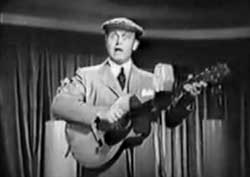 Mama Don't Allow It (1943) is a song better known by its first-line, "Mama don't allow no music playin' round here." A Jukebox soundie for this number stars Rufe Davis, B western comic sidekick player whose last big gig was on the hillbilly television series Petticoat Junction.
Mama Don't Allow It (1943) is a song better known by its first-line, "Mama don't allow no music playin' round here." A Jukebox soundie for this number stars Rufe Davis, B western comic sidekick player whose last big gig was on the hillbilly television series Petticoat Junction.
His performance on Mama Don't Allow It is most endearing because it is simply a charming, charming song that infected my brain in childhood & never went away.
Rufe just stands stone still, strumming his guitar & singing "Mama don't 'low no music playing in here/ Moma don't 'low no music playing in here/ But I don't care what mama don't allow/ I'm gonna play music anyhow/ Moma don't 'low no music playing in here."
Staged as a live performance on the radio, a camera close-up of the radio microphone transitions us into the bedroom of a little brother & sister listing to the second verse, "Mama don't 'low no jews-harp playin' in here."
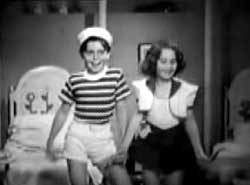 They're quite rightly delighted to hear Rufe imitating a jews-harp. Later in the soundie, these kids, Dick Humphrey & Marilyn Kaye, do quite a good jitterbug dance routine. They're quite rightly delighted to hear Rufe imitating a jews-harp. Later in the soundie, these kids, Dick Humphrey & Marilyn Kaye, do quite a good jitterbug dance routine.
A singing commedian, Rufe's exceedingly amusing doing this number. He makes his way through a list of what mama don't allow to be played, then imitating each instrument, plus train whistle, bazooka, & tapdancing (which he does by clicking his tongue, not by tapdancing).
I've heard this done with a great deal of jump-jazz acumen, as a rockabilly number, & many variants, typically used by a band that makes its way around to each member giving each a solo.
Others, including Rufe's fellow B-western comic sidekick Smiley Burnett, recorded it alone, with imitated instruments. By tradition anything you can imitate can become a verse (if mama don't allow no volcano explosions in here, then do a musical rendition of exploding volcanos). Rufe's version is by no means the best that can be encountered, but he's fun.
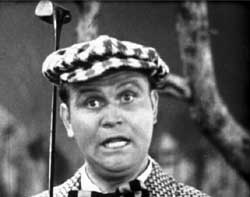 Rufe swipes yet another comic's routine for The Old Sow Song (1942), which was English comedian Cyril Smith's signature pig-grunt number. Rufe in his pork-pie cap & carrying a golf club appears to be looking for his golf ball as he wanders onto a rustic cabin set with a goat in the yard. Rufe swipes yet another comic's routine for The Old Sow Song (1942), which was English comedian Cyril Smith's signature pig-grunt number. Rufe in his pork-pie cap & carrying a golf club appears to be looking for his golf ball as he wanders onto a rustic cabin set with a goat in the yard.
"Well shut my mouth, if it doesn't look like the old homestead!" he says to the little boy serving as his caddy. The little boy has brought a big accordion along with him on the outing, because what golfing day would be complete without one.
Rufe begins singing "There was an old man who had an old sow, oink-ow, raspberry-ow, whistle-ow," & so on, it's absolutely awful. Rufe stops & step close to the camera & says, "Folks, this is your chance to give me the raspberry. I'll sing the words, & everybody join in, but only on the oink-raspberry-whistle. Easy isn't it?"
It's impossible to imagine young soldiers of the '40s or teenagers in a club or malt shop oinking & snorting with Rufe, even when he suggests the Bronx cheer is for Hitler. Truly one of the most abysmal soundies.
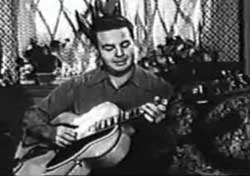 The Jerry Shard Trio performs another version of Mama Don't 'Low (1951) in a Snader telescription. The Jerry Shard Trio performs another version of Mama Don't 'Low (1951) in a Snader telescription.
Shard gets help from a slap-bass player who isn't much to behold & an awfully good guitarist. I'd like to know who the other two guys are, but the group's too obscure (deservedly so) to be included in any of my reference guides I have to hand.
Shard drums on stuff & the floor, quite miserably, then does the penny whistle for the "don't 'low no penny whistle playin' in her" verse, better than his bad drumming; he also has the "no jazz trumboning" verse, & plays a do-wacka-do piece that stinks. Nor is the base player's moment any good.
Really only the verse for "mama don't 'low no guitar playing" pays off with some serious riffs. Neither Shard nor his bass player can sing worth a turd. In all, a fairly lame soundie, & puzzling how the guy had a career even as a to-laugh-at novelty act.
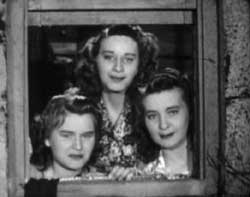 Little-known Borsch-belt family harmony group The Hoffman Sisters could'n't bare to sing the usual lyric "I don't care what momma don't 'low," as it would be disrespectful of mom, so they changed it to "But momma she's asleep right now/ So play that music anyhow." They have their own variant lyrics throughout:
Little-known Borsch-belt family harmony group The Hoffman Sisters could'n't bare to sing the usual lyric "I don't care what momma don't 'low," as it would be disrespectful of mom, so they changed it to "But momma she's asleep right now/ So play that music anyhow." They have their own variant lyrics throughout:
"Momma don't want no 'cordion playing 'round here/ Momma don't want no 'cordion playing round here/ (accordionist sings:) Well I can squeaze it soft & low/ (Hoffman sisters again:) Squeeze it quick & then you go/ Momma don't want no 'cordion playing round here," followed by a minor accordion solo.
Contininuing with The Hoffmans' altered lyrics they go through not wanting "tootin' 'round here" before one of the Denver Darling Hillbillies plays a penny whistle solo; then "no fiddlin' round here" before a slap-bass solo. It then cuts to one of THE girls necking, for a "momma don't want to kissin'" verse, a "no dancin'" verse which wakes up momma to a change of heart.
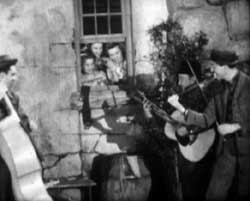 The band playing with the Hoffman Sisters were billed as Denver Darling's Hillbillies. Theirs was a "korn" act & conformed closely to the type, dressing & acting like goofy hillbillies but being pretty fair musicians & singers. Denver himself had been raised on an Illinois farm, with no real association with hillbillies. The band playing with the Hoffman Sisters were billed as Denver Darling's Hillbillies. Theirs was a "korn" act & conformed closely to the type, dressing & acting like goofy hillbillies but being pretty fair musicians & singers. Denver himself had been raised on an Illinois farm, with no real association with hillbillies.
He became a "radio cowboy" in the 1930s on midwest radio stations then moved to New York where he pretty much stayed for the duration of his minor career, with a nationally broadcast radio show from a country music nightclub called The Village Barn.
It appears that the Denver Darling Hillbillies were dashed together for the sake of a handful of soundies after it was discovered panoram customers would actually pay to hear korn music. Their other soundies including Buffalo Gals (1942) & Shy Anne from Old Cheyanne (1942), for the latter being billed as Denver Darling & His Texas Cowhands.
Darling otherwise played mainly western swing & recorded patriotic novelty songs. He cut his first record in 1941, & of his handful of recordings up to 1947, a great many were patriotic diddies. He retired back to the farm in '47 & quickly faded into obscurity.
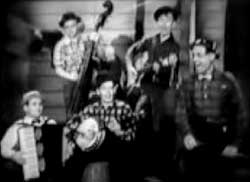 Chuck Palmer & the Rangers, aka Chuck Palmer & His Hillbillies, star in the manic Hillbilly Holiday (1942), singing: "Hand me down my walkin' cane/ Hand me down my walkin' cane/ Oh hand me down my walkin' cane, I'm gonna leave on the midnight train/ All my sins are taken away."
Chuck Palmer & the Rangers, aka Chuck Palmer & His Hillbillies, star in the manic Hillbilly Holiday (1942), singing: "Hand me down my walkin' cane/ Hand me down my walkin' cane/ Oh hand me down my walkin' cane, I'm gonna leave on the midnight train/ All my sins are taken away."
It's almost a good traditioinal tone, but like all too many soundie "hillbillies," they're really just comedy acts, & after singing the first verse with its familiar lyrics, they make up the rest of it to turn it into something akin to Mama Don't Allow No Music in Here.
They're all singing together but Chuck has the lead vocal if anyone does. The other four guys are playing banjo, accordian, guitar, & slap bass, not bad at it either, considering they only do it as a joke. The guy playing the accordion looks to be about four feet tall.
As they start another verse "Hand me down my fiddle & bow," a hillbilly gal (Peggy Diehl) comes out from another room in the cabin & brings Chuck his fiddle & bow. His solo is of "Buffalo Gal" instead of the song they've been singing.
The next verse begins "Hand me down a Spanish song" which is the cue for another beautiful gal to come out from that mysterious other room, dark-skinned & carrying maracas. Chuck takes the maracas & shakes the devil out of them as the dark gal halfheartedly dances.
After the maracas solo the next verse begins "Hand me down my tiny drum," & a third gal comes out not with a tiny drum but with a ball on a stick. She begins to wack on Chuck's cheek & he manipulates his muth to make it a musical mouth-drum event.
"Hand me down my rubber hose" results in Chuck blowing up a balloon & letting the air out of it in squeeky renditions of "Down by the Riverside" & "The Old Grey Mare." The three gals from the backroom meanwhile play with ballons of their own, the gods alone know why.
Hillbilly Holiday was also the title piece for a 1947 three-soundie one-reel release from Official Films. The other two-thirds of that film consisted of My Darling Clementine (1942), & The Martins & the Coys (1941).
Clementine was sung by a milquetoast harmony group called The Fashionaires. And the spoofy hillbilly feud number features an absolutely awful harmony group called The Jesters, assisted by Guy Bonham & His Orchestra.
copyright © by Paghat the Ratgirl
|
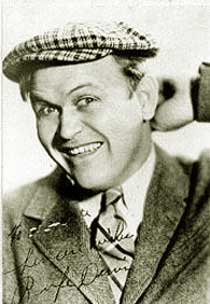

 They're quite rightly delighted to hear Rufe imitating a jews-harp. Later in the soundie, these kids, Dick Humphrey & Marilyn Kaye, do quite a good jitterbug dance routine.
They're quite rightly delighted to hear Rufe imitating a jews-harp. Later in the soundie, these kids, Dick Humphrey & Marilyn Kaye, do quite a good jitterbug dance routine. Rufe swipes yet another comic's routine for The Old Sow Song (1942), which was English comedian Cyril Smith's signature pig-grunt number. Rufe in his pork-pie cap & carrying a golf club appears to be looking for his golf ball as he wanders onto a rustic cabin set with a goat in the yard.
Rufe swipes yet another comic's routine for The Old Sow Song (1942), which was English comedian Cyril Smith's signature pig-grunt number. Rufe in his pork-pie cap & carrying a golf club appears to be looking for his golf ball as he wanders onto a rustic cabin set with a goat in the yard.

 The band playing with the Hoffman Sisters were billed as Denver Darling's Hillbillies. Theirs was a "korn" act & conformed closely to the type, dressing & acting like goofy hillbillies but being pretty fair musicians & singers. Denver himself had been raised on an Illinois farm, with no real association with hillbillies.
The band playing with the Hoffman Sisters were billed as Denver Darling's Hillbillies. Theirs was a "korn" act & conformed closely to the type, dressing & acting like goofy hillbillies but being pretty fair musicians & singers. Denver himself had been raised on an Illinois farm, with no real association with hillbillies.